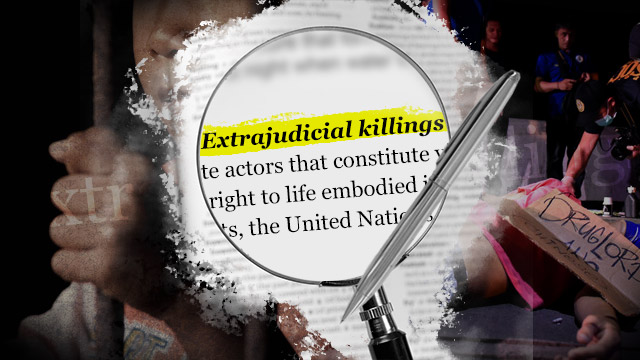

The signing of Republic Act No. 11188 into law on January 10, 2019 didn’t create much of a stir. But, considering the furor over the Speaker-initiated lowering of the Minimum Age of Criminal Responsibility (MACR) at the House of Representatives, perhaps it ought to.
RA 11188 is called “An Act Providing for the Special Protection of Children in Situations of Armed Conflict and Providing Penalties for Violations Thereof.” The statute’s declared aim of protecting children caught in the crossfire is manifestly inconsistent with the unrelenting resolve of the House to criminalize children.
But the most significant part of RA 11188 is not the title, nor the provisions that read like they were lifted from the pages of international humanitarian law conventions and treatises. Its significance lies in section 5(l) which now, finally, defines “Extrajudicial Killings” or EJKs.
This week, we take a Deep Dive into the new law, the definition of EJKs that it provides, and the consequences of the definition on pending and future investigations and prosecutions for EJKs. In succeeding posts, we will address the other significant provisions of RA 11188.
'Moby Dick'
A fundamental principle of Philippine penal law is that there is no crime when there is no law that penalizes an act or omission as a crime. First year students taking criminal law have that drilled into their consciousness repeatedly all throughout freshman year—nullum crimen nulla poena sine lege. No matter how odious, reprehensible, contemptible the act, it is not considered criminal unless a law defines it to be so by prescribing a punishment for it.
EJKs have always been the Moby Dick of many an Ahab. The killings certainly didn’t start with this administration but they certainly piled up exponentially in the two years and change that this administration has been in power. One could make out a case that the assassination of Ninoy Aquino was an EJK, and so, too, that of thousand others who are unknown, unidentified, unmourned. Everyone knows they are happening but, for lack of a definition, accountability has been elusive.
Section 5(l) of RA 11188 now gives us that definition.
(l) Extrajudicial killings refer to all acts and omissions of State actors that constitute violation of the general recognition of the right to life embodied in the Universal Declaration of Human Rights, the United Nations Covenant on Civil and Political Rights, the UNCRC and similar other human rights treaties to which the Philippines is a State party.
The definition is, rightly, a general and all-encompassing one that is rooted in international law. It encompasses acts and omissions that may violate the right to life (Article 3) under the Universal Declaration of Human Rights as well as all other associated rights. It also makes express reference to the United Nations Convention on the Rights of the Child (UNCRC), which under General Comment No. 10 of the Committee on the Rights of the Child would support a higher, not lower, MACR.
The definition, however, is expressly limited to RA 11188 as section 5 qualifies the definition with the caveat, “As used in this Act.” For this reason, EJKs under section 5(l) would refer only to the violations of the right to life of children in situations of armed conflict as contemplated by RA 11188.
EJKS not penalized
Significantly, RA 11188, section 9 does not penalize EJKs as defined under section 5(l).
Section 9 (a) and (b) however punishes the killing of children in situations of armed conflict, which is defined separately in section 5(w) .

Under section 5(w), the “killing of children” is different from an “extrajudicial killing” under section 5(l). This is clear from the separate definitions provided.
It would appear that an extrajudicial killing under section 5(l) is not defined by RA 11188 as a crime because there is no penalty for it under section 9 and it is defined differently from “killing of children.”
Section 5(w) provides an all-encompassing description of acts that would constitute “killing of children” including several enumerations; that it does not once mention EJKs is significant. Under the legality principle of penal law, if no penalty is provided for the act, then it may not be considered to be a criminal act.
Significantly also, after defining EJKs in section 5(l), the law does not mention it ever again. Not only is there no criminal punishment provided, there is also no mention of any other liability – civil or administrative.
Consequences of the definition
With the definition of EJKs, the existential question has at least been resolved. We no longer need to ask what EJKs are and whether there is a law that recognizes it.
The question that now arises is, “so, what now?”
Can the definition be applied to pending investigations or prosecutions for killings believed to be EJKs, especially those carried out under the toxic environment provided by the so-called “war on illegal drugs”?
If RA 11188 had criminalized EJKs, then Article 21 of the Revised Penal Code, which provides that “(n)o felony shall be punishable by any penalty not prescribed by law prior to its commission,” would apply. The definition could only be applied prospectively, otherwise it would run afoul of the prohibition against passing ex post facto laws under Article III, section 22 of the Constitution or the rule in Article 22 of the Revised Penal Code against retroactive application of penal laws that are not favorable to the accused.
Since RA 11188 does not define a crime, or at least it does not appear to, characterizing pending investigations or prosecutions as EJKs, by adopting the definition under section 5(l), might still be of value as the remedies against EJKs are not limited to domestic courts.
Ultimately, whether EJKs under RA 11188 are a crime would depend on judicial interpretation in a proper case. But, pending such an interpretation, the mere definition of EJKs in a statute represents a significant step forward in providing justice to many victims of EJKs over the years. – Rappler.com